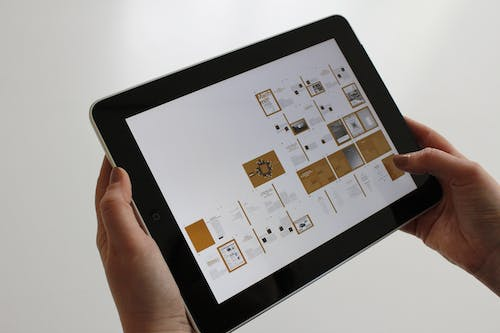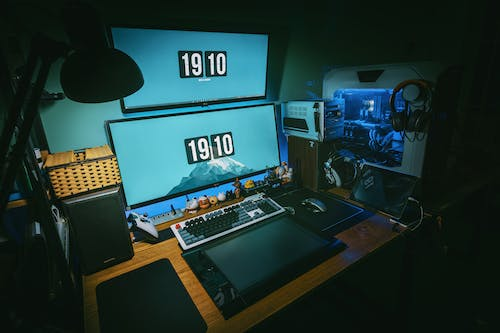There was a time in the past when new technologies were predicted, and companies had ample time to adapt their systems and businesses according to the oncoming tech before the tech became mainstream. It also gave companies the boost to be proactive and gain a competitive advantage to keep the businesses afloat.
Now, however, things are different. Businesses no longer have the timeframe to wait for new tech, understand it, incorporate it into the business, and optimize the business. These days tech updates come in at the same frequency as breaking news. Each day there’s a new and valuable update or trend released that does its part in revolutionizing the IT sector such as cloud security or SAP integration.

This means that companies have to constantly update their policies and practices to thrive in the ever-competitive environment. But even then, there’s no guarantee that the adopted tech will be fruitful.
This is why businesses need to get proactive and look for tech trends before they arrive to have a competitive advantage. This means looking at the latest developments and narrowing them down to the ones that can be useful for the business. Here are some of the top technology trends that’ll be big in the coming few years. Learn how these trends affect different business sectors
Banking Sector
Blockchain Technology
Blockchain isn’t new. In fact, it’s been around for over a decade. But blockchain then and now is pretty different. Back then the tech was new and wasn’t as stable as it is now. It was also easily exploitable. Now though, it’s properly regulated and offers businesses a plethora of benefits, especially in the banking sector.
With blockchain, the usual slow and risk-prone banking system was transformed into a decentralized one that allows better control over the use of banking solutions and also significantly reduces the risk of fraud and theft. Blockchain also enables banking institutions to control, extract, and compile transaction data that can help identify gaps and make it easier to make improvements.
Cloud Banking
Running banking applications on the cloud instead of local servers has helped increase the speed and frequency of transactions. A smoother app allows people to use it better and make lag-free transactions.
It also enables banks to keep a direct line of communication with their clients, resolve issues quicker, and offer more storage, and real-time data analysis. Shortly, this tech can also deliver contactless payments and easily incorporate crypto and NFT technologies into the mix.

Lower Risks
Even with highly secure systems and practices, the banking industry is still considered highly risky. This is mainly due to the large amounts of data that are shared and transactions performed each day. But the latest tech trends are making it easier for the banks t increase security levels without making their systems heavy.
This means that banks can invest more in quick authentication systems, reduce money laundering, and withstand cyberattacks without compromising their security.
Web 3 Banking
The biggest issue with banking is the lack of a personalized approach. Even with a lot more control over their finances, individuals and businesses alike still struggle to get personalized control over their banking options. But with Web 3, it seems that decentralized and personalized banking is soon to become a reality. It’ll allow people to manage their bank accounts and get highly personal options. This means that certain clients can pick which services they require, and the bank can only integrate those with their accounts. The best part is that these services can be customized according to each client’s needs.

AI-Enabled Banking
While digital banking has seen a lot of innovation, in-person banking is still pretty far behind. People still need to wait in long lines, and wait an entire precious time to get one-on-one services. But with AI, that’s about to change. AI-powered banking can not only understand customer concerns but also offer quick solutions based on their unique needs. pretty soon, this AI will also decrease in-person banking, and people can do all the transactions, no matter how large they’re through digital banking.
Retail Sector
Integrated POS
With e-commerce, customers can’t physically visit a store, so they opt for a pre-shopping search or POS to get the information they need before making a purchase. This POS research is heavily cataloged by search engines and offers great insights. But in the near future, people will be able to link their business pages with this POS system to allow shoppers to find product information without visiting the website.
This will give a massive advantage to businesses to reach and attract a wider set of audience and promote their products. This POS system will also mean that customers no longer need to spend more time researching a product. Instead, they can use the POS system to directly find and view products they’re interested in.
Omnichannel Retail
Omnichannel experience is all about targeting customers from various touchpoints. This streamlines a brand’s customer acquisition strategy and enables them to reach its target audience faster. Rather than having an in-person and online store, retailers are going beyond and investing in augmented reality (AR). This will allow shoppers to create a virtual store within their homes and look at products in real time and pick the ones they want. This is done through AR devices that allow customers to view a virtual version of the product in 3D. Once this technology is perfected, the brands that adopt it early on will enjoy a market-leading position.

Autonomous Delivery
While this isn’t anything new, autonomous delivery is certainly getting a lot of updates in the coming years. One of these updates is the use of AI to help bots navigate the streets better and reach customers faster. This will create a huge market in the future where companies can expand their range of services without adding more employees to the mix.
Automation Commerce
Automation commerce or A-commerce isn’t about automating the retail experience. Instead, it’s more about automating the payment processes. This automation can be incorporated in the form of subscription packages, automatic purchases, and storing payment information without jeopardizing confidentiality. Once this tech becomes mainstream, it’ll also reduce the number of steps required to complete a purchase.
Healthcare Industry
Healthcare Data Analytics
In the past few years, quick healthcare has become quite important, and many big names are investing heavily in cutting down treatment and diagnosis times for patients. With healthcare data analytics, healthcare providers can cut down the time to do a general checkup on the patient and use data analytics to deduce whether the patient has any abnormalities. Based on the outcome of the analysis, AI-powered models can assign beds, doctors, and possible treatments and determine the required equipment. This will significantly reduce waiting times and make healthcare facilities better manage their patient influx.

Healthcare IT Support
With so many departments working together to deliver care to patients, coordination becomes a big problem, especially in bigger facilities where care can be delayed due to miscommunication. Healthcare IT support can cut down the time required to communicate between each department and personnel and quicken the response time. It can help hospitals implement a healthcare IT infrastructure that integrates all aspects of the institute and delivers a robust solution for delivering faster healthcare.
Digital Health
Digital health or remote health is an upcoming trend that’s working to bridge the gap between patients and doctors by reducing distance. Instead of traveling to a different location to get a diagnosis, with digital health, patients can get a consultation, diagnosis, treatments, and even surgeries from remote locations. This will revolutionize healthcare and increase access to remote areas and areas hit by any calamity.
Automotive Industry
Connected Cloud Services
Ongoing service for purchased cars is a lucrative field, especially when it comes to modern cars with complex tech. Connected cloud services can offer maintenance services to keep the cars up to date with the latest software. On top of that, cloud services can also monitor injury risk, run diagnostics, and deliver custom telematics through the cloud. It’ll make manufacturers and other automotive service providers to better manage their customers and allow remote support through cloud-based IoT services. The cloud can also improve the tracking and vehicle access systems for added security.
Sustainability Management
Sustainability is the biggest upcoming tech trend. As companies are moving towards cleaner solutions, sustainability management using AI, IoT, and other tech metrics is gaining a lot of traction. Companies are actively investing in digital waste management, health and safety analysis, injury management, and digital regulation and compliance. Through this, automotive companies can reduce their cost of operations and have agile systems that can adapt to changing compliance regulations regarding sustainability and adequate utilization of resources.
Digital Transformation
Digital transformation of traditional automotive practices has been going on for a while. But with the sudden shift in the nature of tech available as well as their capabilities, it has become much easier for companies to make their production processes agile and self-sustaining. Utilizing cloud computing to access and integrate critical data, offering wireless support for production processes, and ensuring smooth data delivery are just a few things modern digital transformation can do for automotive companies. In short, these transformations can turn automotive companies into digital ecosystems.
Analytics Engineering
Analytics engineering mainly concerns with the ability of a facility to analyze large volumes of data in real time and make smart decisions to improve and further develop the production process. It can also be used on the client end to monitor customer relationships, manage vendors, monitor project and product lifecycle, and reduce operational costs with optimized processes. Besides that, analytics engineering also concerns data engineering, testing and validation, improved UX, connected infrastructure, and working towards getting a competitive edge in the industry.

System Modernization
As the name suggests, system modernization refers to updating the systems according to changing industry standards and trends. It includes cloud computing, edge analytics, and DevOps for production, testing, delivering, repairing, maintenance, and distribution. Besides the production part, system modernizations can also help with budgeting and forecasting, sales and marketing, human resource, and on-demand training. This helps the companies to streamline their landscape and make it highly agile to the processes are optimized.
How Can You Prepare Your Organization For These Trends?
The best way to keep up with the changing trends is to find experts who are already working on the latest technology. Look within your specific industry to find consultants that can help you develop and implement technologies that’ll give your firm the competitive edge it needs.
On top of that, you can establish an R&D department if your firm is big enough. With an R&D department, it’s easier for a few selected individuals to only focus on the growth and development of the firm and research and implement different emerging technologies. This way, you’ll always be a step ahead of your competitors in researching and adopting emerging technologies.
Stay On Top Of The Latest Technological Trends With GCTechInfo
Stay ahead of your competitors and optimize your business to the fullest with our reliable solutions. At GCtechInfo, we thrive to bring you the best IT solutions to help you scale your business and take it to new heights. We offer a variety of digital transformation services to help you optimize your company.
Our services include IT support services, managed IT services, SAP consulting services, cybersecurity, data analytics, testing and QA, and DevOps services. GCTechInfo helps businesses organize their databases, perform data aggression, get insights into your data, and improve their infrastructure, all the while maintaining your security.

We specialize in retail, automotive, banking, and healthcare sector and have served many satisfied customers. Our firm hires the best workers with exceptional skills to help you increase your return on Investment and strengthen your business practices.
Moreover, we also offer risk assessments to ensure your firm stays profitable and your systems are dependable. Find out more about how we can help you by checking out our services and getting in touch with us to learn more.

